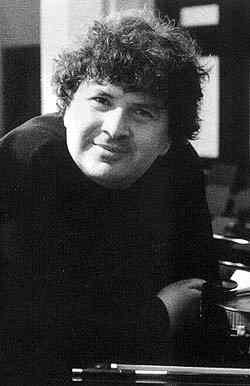Some composers are so unfashionable that even the centenary of their birth warrants little or no coverage. Were there any UK performances in 1996 for Roger Sessions's 100th? If the 50th anniversary of Nikos Skalkottas's death might seem equally worth overlooking, remember the significance his music attracted back in the 1950s and '60s, when Hans Keller lauded him as one of the five most significant composers this century [of the other four, three of their surnames also begin with 's'; one begins with 'b'] and the 1969 Bath Festival was built around a number of premieres. Since then, his music has fallen into the 'respected but unheard' category, with little available on disc until the Swedish company BIS began their excellent series of recordings last year.
 One of the highlights is Georgios Demertzis's account of
the Violin Concerto
(BIS-CD-904),
as perfect a combination of Schoenbergian expression and Stravinskian mobility
as you'll hear. Demertzis is also first violin in the New Hellenic Quartet,
and it is to their commitment to Skalkottas that we owe this exceptional
concert. Skalkottas's quartet output centres around four string quartets,
of which the second, premiered posthumously but then mislaid, has yet to
be recovered. The New Hellenics gave us the third and fourth quartets, plus
five of the Greek Dances in the composer's suave and idiomatic transcriptions,
received with obvious enjoyment by the capacity audience. Skalkottas's mature
compositions are intricate, highly-wrought affairs, never obstruse but demanding
the listener's full concentration. All credit then to those present for giving
the music the attention it needs. Dating from 1935, the Third Quartet marks
the onset of Skalkottas's maturity; the serial method of Schoenberg is treated
flexibly and creatively, along with a rhythmic dynamism which, stemming from
Stravinsky and even Bartók, has become equally personal. The three
movements play for 20 minutes, beginning with an Allegro moderato where the
distinction between harmonic and thematic presentation of the material is
integral to the music's dynamism. The Andante has a heightened lyricism redolent
of Berg's Lyric Suite, while the closing Allegro vivace is relaxed to the
extent that its underlying ländler rhythm offsets the metamorphoses
of the main rondo theme.
One of the highlights is Georgios Demertzis's account of
the Violin Concerto
(BIS-CD-904),
as perfect a combination of Schoenbergian expression and Stravinskian mobility
as you'll hear. Demertzis is also first violin in the New Hellenic Quartet,
and it is to their commitment to Skalkottas that we owe this exceptional
concert. Skalkottas's quartet output centres around four string quartets,
of which the second, premiered posthumously but then mislaid, has yet to
be recovered. The New Hellenics gave us the third and fourth quartets, plus
five of the Greek Dances in the composer's suave and idiomatic transcriptions,
received with obvious enjoyment by the capacity audience. Skalkottas's mature
compositions are intricate, highly-wrought affairs, never obstruse but demanding
the listener's full concentration. All credit then to those present for giving
the music the attention it needs. Dating from 1935, the Third Quartet marks
the onset of Skalkottas's maturity; the serial method of Schoenberg is treated
flexibly and creatively, along with a rhythmic dynamism which, stemming from
Stravinsky and even Bartók, has become equally personal. The three
movements play for 20 minutes, beginning with an Allegro moderato where the
distinction between harmonic and thematic presentation of the material is
integral to the music's dynamism. The Andante has a heightened lyricism redolent
of Berg's Lyric Suite, while the closing Allegro vivace is relaxed to the
extent that its underlying ländler rhythm offsets the metamorphoses
of the main rondo theme.
The Fourth Quartet of 1940 takes this musical idiom to its relative extreme. Playing for 38 minutes, it requires a stamina comparable to the late quartets of Beethoven and the first quartet of Schoenberg: sobering to think that it was completed in little more than four weeks, and is only one of a whole series of large-scale works that Skalkottas worked on during the remainder of his short life. The opening Allegro molto vivace achieves its expansiveness through dynamic though subtle cross-referencing of themes, rather than by its actual length, while the Andante molto espressivo has a musical and emotional breadth which more than sustains the six diverse variations on its opening melody (a pity these were separated so obviously in this performance). The Presto must be unequalled in the literature for sheer velocity, with the lilting trio making an almost surreal contrast. If the Allegro guisto finale seems not quite to wrap up the piece conclusively, this may be because of its brevity and swiftness of thought. Perhaps it would be more convincing layed attacca after the scherzo? At any rate, the New Hellenics powered through to the final bars with absolute conviction, and to deservedly prolonged applause.
The New Hellenic Quartet's recording of Skalkottas's string quartet music is due for release on BIS next spring. For now, Georgios Demertzis's account of the violin concerto, and just-released disc of the chamber music for violin (BIS-CD-1024) [review] are mandatory listening for anyone willing to give this extraordinarily original and engrossing composer the attention his music so richly deserves.
Richard Whitehouse
 Return to:
Return to: